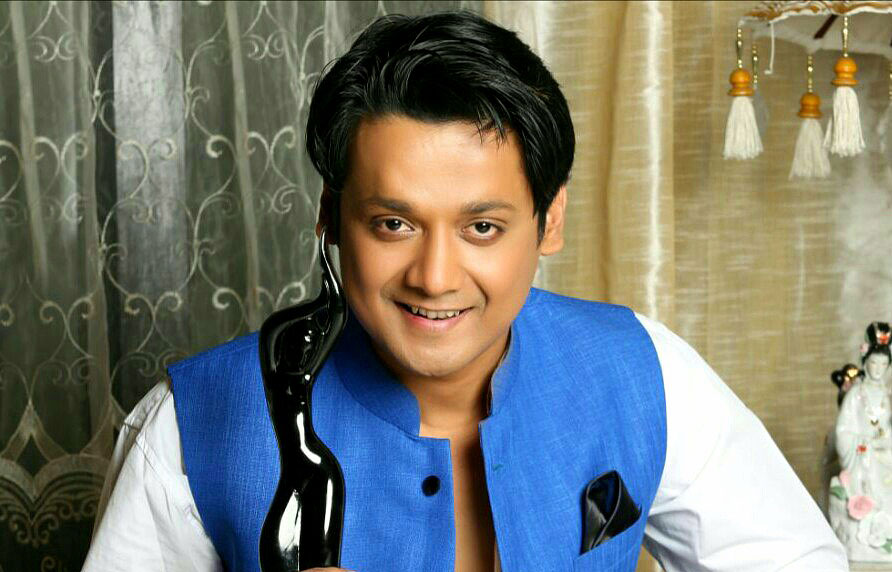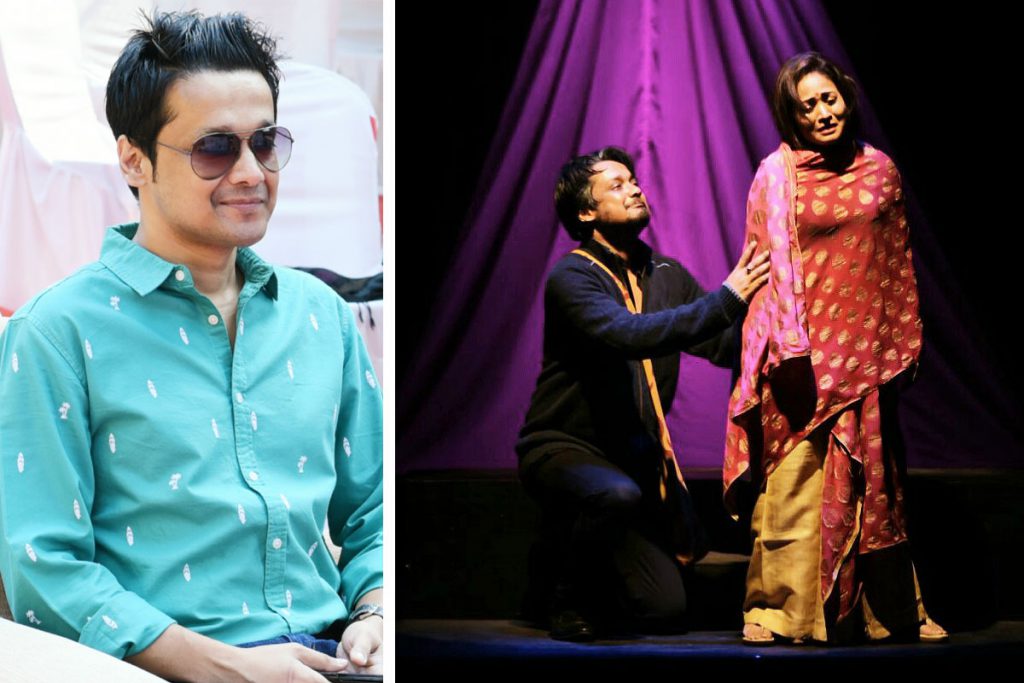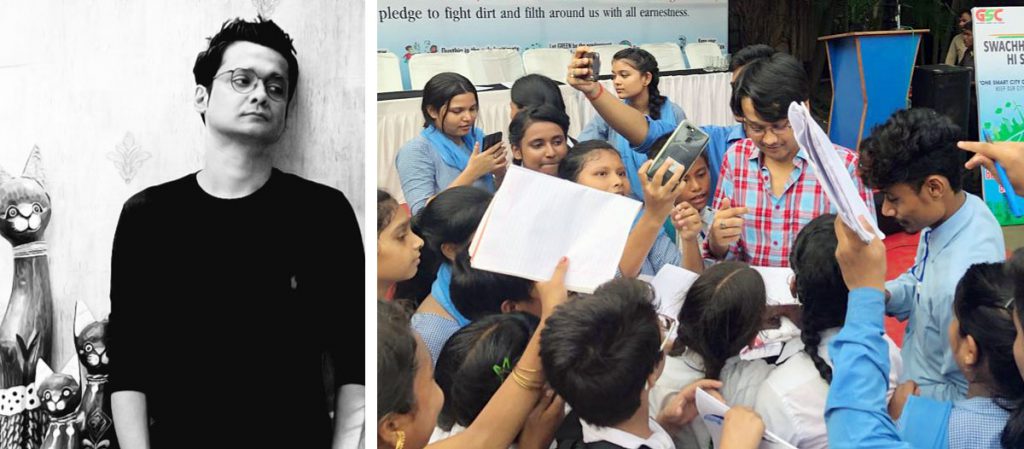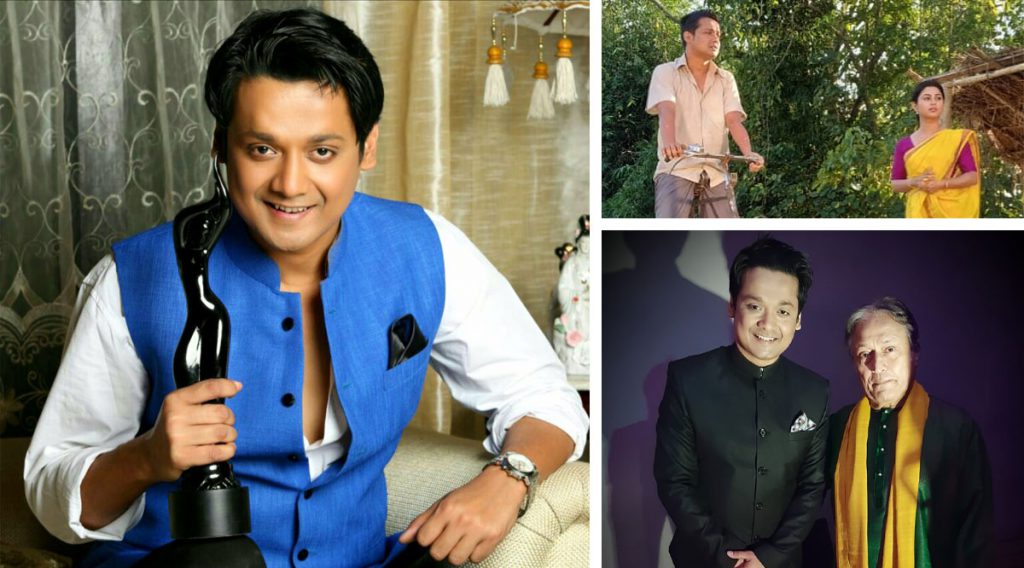
There’s a story Kopil Bora loves to tell - of how a little hissy fit he threw as a school-going boy at the rehearsals for JB Priestley's An Inspector Calls, set him off to explore Assamese theatre and cinema. He was just 16.
The Theatre Foundation was practising for Priestley’s
Soon Bora became integral to the state’s vibrant theatre scene. The stage would help him hone his craft so fine that he would be the natural choice for National Award-winning director Bidyut Chakrabarty, i
Now in his early-40s and with an enviable repertoire of plays and movies to his credit, he says it is good fortune, his mother’s creative genes as well as a strong desire to do good by his father that have kept him going through two strenuou
Bora looked rested when NEStor
In this interview, Bora gives us a masterclass on Assam’s mature film industry; he speaks of his childhood, why he loves transforming into another person, and the reason he believes he’s a perfectionist.
The last two years were breakthrough years for Assam’s film industry with the release of several national and international award winners and blockbusters. That might just help it recover quickly from its pandemic-induced coll

Tell us about your childhood in Guwahati and how you took to acting?
My childhood was great fun, almost like a Tom Sawyer adventure. My father worked in the Assam Agriculture Department and we lived in a picturesque colony in Guwahati with neighbours from different cultures and backgrounds. I would say it was a great, unadulterated childhood. Those moments are precious, they are still very important to my personal growth. I still go back to them for emotional inspiration.
I attended Don Bosco High School, Guwahati and for senior secondary and graduation, I went to Cotton University. While I was in 11th grade, I was drawn to an organisation called Theatre Foundation started by Natya Prabhakar Satya Prasad Barua. They were doing English dramatist, J B Priestley’s play, An Inspector Calls, in Assamese. I was asked to help backstage. One day, one of the characters didn’t turn up and I was asked to stand as proxy for the missing person. Mr Barua was happy with my reading and I was asked to read the part in the participant’s absence. Now, when this guy came back after a couple of days I was very unhappy. I created a big scene. I said I had told my family and relatives that I’d be playing this part so I shouldn't be asked to leave. Finally, they gave in and I was happy performing it. Later, I became a part of Cotton College’s Shakespeare Society which truly trained me to be a professional.
You are known as Mr Perfectionist of Jollywood? Why do you think you have been associated with this title?
The term Jollywood is pretty new and I have no clue why our industry is suddenly being called this. I prefer to call it the Assamese film industry. The reason behind me being called a perfectionist could be because of my theatre background which has taught me to do things as well as possible.
I am finicky about detail. I'm particular, not only about how the conversation would sound but also about details like what the background or the colour of the wall is going to be like, which is not even my department. I strive for perfection because it is the totality that matters to me.
In cinema things are different. Every department has to be precise, everyone has to be on the same page, to think alike to reach a certain goal. I think sometimes the perfectionist remark for me also has a negative connotation but I take it in my stride. As an actor, I'm particular about time, dialogue, and expect the same with others. I like to operate this way because it ensures a great end result. At the end of the day, the idea is to deliver a thought-provoking performance to the audience.

What kind of cinema did you grow up watching? Was becoming an actor in your scheme of things?
As kids even though we weren’t exposed to a lot of cinema I was besotted with movies and acting. I remember our father taking us to watch the old English classics. We weren’t allowed much television but grew up watching Dooradarshan programmes like Chitrahar etc. It was only in the late 90s when I was in high school, that I started watching cinema and wanted to be a performer. I used to just enjoy watching people perform. I was very sure, be it any medium, I would be a performer.
I lost my mother when I was five years old and couldn’t spend much time with her. Sometimes I feel I have inherited her creative genes. I owe a lot to my father who, as a single parent, brought me and my brother up. Unfortunately, I lost him in February this year but can still feel his presence and care around me.
I always wanted to make him proud. He was always very supportive of my career choice. I had started signing films when I was in college. My dad’s only condition was that I should finish my studies and do well in my exams. I had to always wrap up my shoots before the exams or stop everything to focus on my studies.
How did the first break come your way?
I was performing in an iconic play called Purush, written by Padma Shri Arun Sarma, a renowned playwrightof Assam, and directed by another eminent director, Avinash sharma. That’s when director Bidyut Chakrabarty, one of the finest filmmakers of Assam spotted me. He was just about starting a new film called Gun Gun Gaane Gaane and selected me for the lead role. It was a great break for a first-timer like me and a challenging role for I had to play a character suffering from a huge identity crisis. The depiction of that emotion needed a lot of preparation and fine execution.
You wear many hats - as an actor, anchor, a voice artist. Which one is closest to your heart?
I have been with All India Radio since the time I was in school. I used to anchor all the Spic-Macay functions at our school. One day someone from the radio noticed me anchoring a show and approached me to do voice over for a documentary for AIR. That’s how I got associated with All India Radio. When it comes to anchoring functions or events, now I do very selective anchoring, say two or three functions a year. That’s how I had started so I enjoy doing it. But acting is close to my heart. It is through the medium of acting I get to perform as someone who is not me whether it is in front of the camera or theatre. I enjoy both cinema and theatre and think every medium has a different challenge to throw at you, which makes it exciting.
Which are your most successful commercial films and which ones have been the most rewarding as an artist?
My first two films (Gun Gun Gane Gane and Mon) were a huge success at the box office and also critically acclaimed because they were different from typical mainstream films. All the subsequent films like Kadambari and Jibon Baator Logori, Prem Pahare Bhoyame, Aastoraag
As an artiste, my first film meant a lot to me especially because it was directed by such a renowned director (Bidyut Chakraborty). It gave me the chance to show my acting prowess in my first film itself. I consider myself lucky to have got such a challenging role in my debut film - a romantic film with an unusual role for the protagonist.
Another significant film for me was Aajeyo, directed by Jahnu Baruah, another director I had longed to work with. Also, it was an important film since it brought a big change to Assamese cinema in 2016 for it reflected society and people’s struggles around the time India gained independence.
How far has the Assamese film industry come? Do you think it has undergone a transition over the years?
It all began with Assam's first talkie called Joymoti, which was the third talkie of Indian cinema and was made in 1935. Over the years, like many other film industries, the Assamese film industry has also had its ups and downs. Initially, Assamese films were social drama apart from mythological and commercial cinema.
With great filmmakers like Bhabendra Nath Saikia’s
In the current scenario, we need more cinema halls so that movies are available to more and more people. There is scope to explore many more genres of cinema. One place where we can do better is if we fall back upon our rich literature. We can take it to a glorious stage. Passion is the driving force of the industry. It is because of their passion, that Assamese filmmakers keep going. We have seen that if a low budget film like (Village Rockstars 2017) can be nominated for Oscars and win so many awards and recognition all over the world then there is much more we can explore and present to the world.
If an offer comes your way, would you consider Bollywood?
Why not? As an actor, I would like to broaden my horizon. Now that such good content is coming out frequently, the conventional definitions of an actor have been broken. It is no longer about good looks, but the emotional connection you can have with the audience through your craft.
How are you keeping yourself occupied and motivated during this pandemic? What is the message you would like to send out to other artists?
I'm using this time by reading and catching up on some great movies which I hadn't watched earlier. At times like these, you can't become complacent, so I am keeping physically fit by exercising and walking.
While I’m using this time to unwind, I feel terribly sad for the daily wage workers, people from the hospitality and film industry and other sectors that have been badly hit. It is going to take some time for our industry to bounce back but cinema will come back. I’m hoping and praying that the vaccine comes out soon and we can put this all behind us.

Story Partner: Media9

